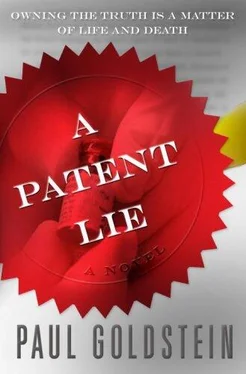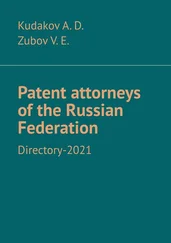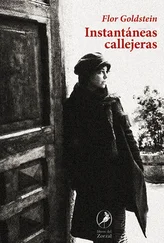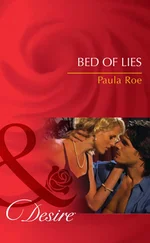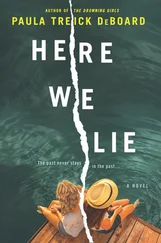Paul Goldstein - A Patent Lie
Здесь есть возможность читать онлайн «Paul Goldstein - A Patent Lie» весь текст электронной книги совершенно бесплатно (целиком полную версию без сокращений). В некоторых случаях можно слушать аудио, скачать через торрент в формате fb2 и присутствует краткое содержание. Жанр: Криминальный детектив, на английском языке. Описание произведения, (предисловие) а так же отзывы посетителей доступны на портале библиотеки ЛибКат.
- Название:A Patent Lie
- Автор:
- Жанр:
- Год:неизвестен
- ISBN:нет данных
- Рейтинг книги:3 / 5. Голосов: 1
-
Избранное:Добавить в избранное
- Отзывы:
-
Ваша оценка:
- 60
- 1
- 2
- 3
- 4
- 5
A Patent Lie: краткое содержание, описание и аннотация
Предлагаем к чтению аннотацию, описание, краткое содержание или предисловие (зависит от того, что написал сам автор книги «A Patent Lie»). Если вы не нашли необходимую информацию о книге — напишите в комментариях, мы постараемся отыскать её.
A Patent Lie — читать онлайн бесплатно полную книгу (весь текст) целиком
Ниже представлен текст книги, разбитый по страницам. Система сохранения места последней прочитанной страницы, позволяет с удобством читать онлайн бесплатно книгу «A Patent Lie», без необходимости каждый раз заново искать на чём Вы остановились. Поставьте закладку, и сможете в любой момент перейти на страницу, на которой закончили чтение.
Интервал:
Закладка:
“I'll call him when I get back.” Absently, Seeley continued turning the pages in the sketchbook. At one, his hand froze. He had seen the portrait-the steel-rimmed glasses, the odd, incipient double chin-the first time he went through Pearsall's steno pads, but that was before he met St. Gall's young in-house lawyer in Judge Farnsworth's chambers. What if Dusollier was the stranger with the French accent Lucy Pearsall saw talking to her father at choir rehearsal?
Seeley cursed himself for being so preoccupied with the trial that he failed to make the connection earlier. In the etiquette of a lawyer's life, a company's in-house lawyer rarely speaks to the outside counsel of his adversary. Even if they were colluding, if St. Gall had a message to deliver to Pearsall, it would be through Thorpe or Fischler. Or Dusollier could have spoken with Barnum. If it was Dusollier who talked to Pearsall in the hallway of Lucy's school, there was no good reason for him to do so. And if Lucy had seen him, he had probably seen her.
Mrs. Rosziak said, “This lawyer, Girard, sounded like he'd be glad to talk with you.”
Talking like this with Mrs. Rosziak, about Girard, phone calls, and families, Seeley felt a spasm of panic, a sudden premonition of the Ellicott Square Building collapsing into dust, as if consumed by an explosion or a wrecking crew. “How's the building?”
“You mean the office? The usual. The radiator's on the fritz again.”
“Call Rudy. Get him to fix it.”
Tina was in the doorway and Seeley put his hand over the phone.
“Chris called. The jury's coming back. The judge wants everyone there in an hour.”
Seeley held up a hand for Tina to wait. “I'll be back on Monday. Tell Rudy to get it fixed by then.” And, forgetting about Andy Lewandowski, he said, “Remember, tell Harold not to talk to anyone.”
He rose and handed the steno pad, open to Dusollier's portrait, to Tina. “Make a copy of this picture and get it to Judy Pearsall. I think Pearsall had a fax machine in his office at home.”
Tina nodded. “I have the number.”
“Ask her to show it to Lucy. See if she recognizes him. Send it to Lieutenant Phan, too. Tell him it's from me.”
“About the jury-should I call Ed Barnum?”
“Please.”
“And your brother?”
“Sure,” Seeley said. “Call him, too.”
In the taxi to the courthouse, Seeley dialed Judy Pearsall's number. The housekeeper said she was at a museum meeting, but when he told her that it was urgent and involved Lucy, gave him her cell number. Five minutes after he left his number on her voice mail, Judy Pearsall called back, her voice a whisper.
Seeley said, “Tina's faxing you a sketch your husband made of someone. I want you to show it to Lucy. It may be the man she saw talking to him at school.”
“I appreciate your interest, Mr. Seeley”-though hushed, the voice was annoyed, dismissive-“but I just stepped out of a board meeting. We're not even halfway through our agenda.”
“When does Lucy get home from school?”
“Half an hour, forty-five minutes. Really-”
“This is important. You need to be there when she gets home and have her look at the picture. If it's the same man, I want you to call Lieutenant Phan.”
“I don't understand-”
“Lucy may be in danger.”
The phone went silent. “Thank you. I'll leave right now.”
As he snapped the phone shut Seeley tried to remember whether the doorman at their apartment building walked to the bus with Lucy, or merely watched her from his post in the lobby.
TWENTY-FOUR
A trial transcript records every spoken detail of the proceeding. But for the participants, it is the courtroom that accumulates the veneer of incident and memory-the flickering overhead light that needs to be replaced, the edge of counsel's table where the finish has worn off, the clock high above the watercooler that is regularly six minutes fast. This is where the red-haired court reporter and the hoop-earringed court clerk faced each other like bookends and, in the corner next to the jury box, where the bailiff sat virtually motionless for the entire trial. And at 4:30 on a dying autumn afternoon, it was a place that reminded Seeley, coming in through the swinging gate, how irretrievably justice can take a wrong turn.
The bench was empty, but the six remaining jurors were in the box. Seeley recognized most of the faces in the gallery. The lawyers for the investment banks were there, and even a few of the protesters had learned of the jury's return, although apparently not Phil Driscoll. Gail Odum was in the back, scribbling on a notepad. Leonard was in the second row and Barnum was at counsel's table, his back to Palmieri. At the defense table, Fischler turned as Thorpe came through the gate. The clerk called for all to rise and Judge Farnsworth entered the courtroom, robes swirling as she settled in behind the bench. Her sharp glance combed the room, leaving Seeley in no doubt about the outcome of the jury's deliberations.
“Mr. Foreman.” There were to be no preliminaries, no courtesies to the gallery nor congratulations to the jurors. The schoolteacher, a beanpole of a man with a prominent Adam's apple, rose.
“Has the jury reached a verdict?”
“No, Your Honor.” The Adam's apple worked furiously. “No, we have not. We've reached a stalemate. Although we tried, we haven't been able to break it.”
“Has the jury voted?” Farnsworth's voice was pinched.
“Several times, Your Honor.”
She looked directly at Seeley. “And what was the result?”
“The last vote was four in favor of validity, two opposed.”
“And the vote before that?”
“It was the same, Your Honor.”
“And what was the result of the first vote?”
The foreman looked down at a page torn from a legal pad. “Five in favor of validity, one opposed.” He looked at the sheet again. “We didn't vote on infringement. You told us not to unless we agreed that the patent was valid.”
“Thank you, Mr. Foreman.”
Farnsworth methodically canvassed the jury with her eyes. The foreman, uncertain whether the judge was finished with him, hunched over awkwardly, waiting for a signal from her, and when it didn't come, finally took his seat.
Seeley had been watching the foreman, and now when he looked across the double row of downcast faces, he was startled to find the kid staring at him. Gary Sansone's jaw was set, his lips compressed, but at the corners was the smallest possible smile. He had been the first to vote against the patent, the one, Seeley was sure, who had persuaded the second juror. He was thinking that he defeated Seeley. He had read the news story or been told about it. Or maybe it was just that he resented Seeley, Seeley's client, and the client's celebrity scientist, Alan Steinhardt. Whatever the reason, in defeating them he did just what Seeley expected he would do. Seeley felt diminished, using the kid this way, and the knowledge that there was no alternative did nothing to relieve that feeling.
Farnsworth asked whether any of the jurors objected to the foreman's description of their deliberations, and when three or four shook their heads, she said in the same sad voice, “You have failed in your duty here. Your duty was not just to attend the trial and to deliberate among yourselves, but, at the end of this large expenditure of time and resources by the parties, by the taxpayers, and by this court, your duty was to reach a verdict. A trial cannot conclude without a verdict.”
Seeley wondered how much of the reprimand was genuine-this was the judge's first hung jury-and how much was Farnsworth building her legend, and decided it was mostly genuine. He felt a hard look coming from the defense table. It wasn't Thorpe, whose perfectly tailored gray flannel back was to him, but Dusollier. The St. Gall lawyer's expression was bitter around the slash of his mouth. This was not the complacent Swiss lawyer Pearsall had captured in his sketchbook.
Читать дальшеИнтервал:
Закладка:
Похожие книги на «A Patent Lie»
Представляем Вашему вниманию похожие книги на «A Patent Lie» списком для выбора. Мы отобрали схожую по названию и смыслу литературу в надежде предоставить читателям больше вариантов отыскать новые, интересные, ещё непрочитанные произведения.
Обсуждение, отзывы о книге «A Patent Lie» и просто собственные мнения читателей. Оставьте ваши комментарии, напишите, что Вы думаете о произведении, его смысле или главных героях. Укажите что конкретно понравилось, а что нет, и почему Вы так считаете.
